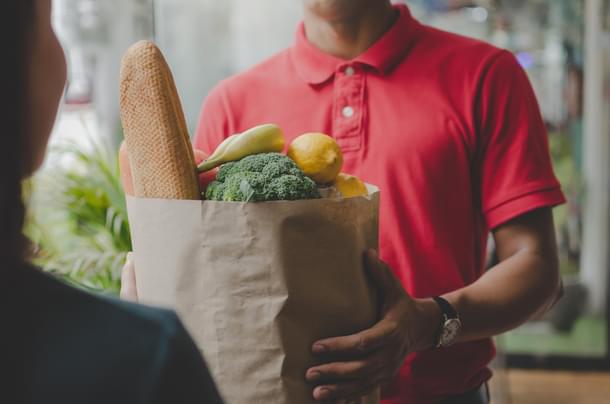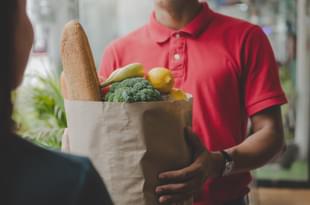News Brief
How E-Commerce Companies Are Working To Deliver Orders Amid Surging Demand, Surging Cases, And Increasing Restrictions
Bhaswati Guha Majumder
May 07, 2021, 06:42 PM | Updated 06:42 PM IST
Save & read from anywhere!
Bookmark stories for easy access on any device or the Swarajya app.


The emergence of e-commerce companies in India has changed the way business is done in the country and the sector is expected to grow to a size of $200 billion by 2026.
Much of the growth of the e-commerce industry has been triggered by an increase in internet and smartphone penetration in India.
The 2020 lockdown in India boosted the popularity of online services, as millions of people, turned to e-commerce platforms for the home delivery of goods.
In May last year, a survey was conducted about permitting e-commerce platforms to sell and deliver all goods after the relaxation of the lockdown of April 2020.
The survey revealed that a majority of respondents were in favour, while about 18 per cent wanted the e-commerce sites for essentials supplies only.
At that time some news reports claimed that a few delivery agents from e-commerce companies like Big Basket, Grofers and MedLife were allegedly harassed by police officers during the lockdown.
As a result, the deliverymen refused to provide the service and orders placed by people on online platforms were cancelled.
These e-commerce companies were asked to provide identity cards to their delivery agents, who would also be issued curfew passes.
Medlife CEO and co-founder Ananth Narayanan said in a statement: "Medlife delivery personnel Prakash in Delhi in the Todapur area was bringing back curfew passes and was hit by the cops on the way back to the fulfilment centre.”
“In the process, he was injured and suffered bruises on his face and body. We now also have reports of similar incidents in Bengaluru," he added.
He urged the state governments and concerned authorities to make sure that strict instructions were given to the police to permit delivery personnel with valid documentation to perform their duties in these times of crisis.
During the first wave of Covid-19 in India, some e-commerce players also urged the government to expand the scope of essential products beyond food items and medicines to include other products such as routers and cable that may be required for customers who just started to work from home.
The Challenge Continues
After the first wave of Covid-19 when people started to think that some kind of normalcy was returning, once again the pandemic hit major cities in India, forcing government authorities to impose restrictions due to the surge in coronavirus cases.
In the regions which are now reporting maximum cases during the second wave of Covid-19, the demand for online delivery service for groceries and other essentials is continuously rising.
As the lockdowns or curfews return, consumers again started to look for e-commerce websites to place orders.
Key players in this field, Flipkart and Amazon India, as well as e-grocers like Bigbasket and Grofers once again found themselves in a challenging situation.
All these online platforms are now seeing a surge in demands from customers.
As a result, e-commerce companies now have opened a limited number of slots for deliveries.
The load caused by the increased customer demands has also impacted the delivery time of respective orders.
There is hardly any in-a-day delivery option available and the deliveries are taking 3-7 days because of a huge jump in the number of orders and a shortage of supply-chain staff.
According to the Times of India, an executive from an unnamed e-grocery said: “In Delhi, things are still fine but there is a significant surge in orders across Mumbai compared to last year.”
“We are trying to open new slots but have to be practical about it since consumers will get upset if deliveries are delayed by more than a few hours,” the spokesperson added.
In Maharashtra, which is the most affected state in India, Amazon has refused to take orders for non-essential products from categories like electronics, fashion, appliances, mobile phones, furniture and others.
But the e-commerce giant is delivering products like handwash, masks, sanitisers, disinfectants, healthcare devices, grocery, household cleaners, baby essentials and others.
A Grofers spokesperson also described the challenges during the second wave.
He said that since there is a movement of the migrant workforce due to the spike in Covid cases, the company is now hiring additional warehouse and delivery staff to address the surge in demand so that the services can be provided to as many households as possible.
“We are opening up slots on the app every day for our customers while prioritizing the supply of essential products,” he added.
In the big cities like Delhi and Bengaluru, which are currently trying to curb the spread of the virus, Grofers’ delivery is taking at least 4 to 7 days.
It said earlier that those orders for certain items have increased by as much as 150 per cent in severely hit regions.
During night curfew in Delhi, some restaurants are also facing issues with food delivery.
Spokespersons from food delivery companies like Zomato and Swiggy said: “Our delivery boys faced issues after the curfew announcement when they were out for delivery. Usually, we take orders till 11 pm, but are now closing the restaurant by 10 pm till there’s clarity on whether food can be delivered beyond 10 pm.”
In the case of the Greater Noida region, which is currently under lockdown, imposed by the Uttar Pradesh government, Rentickle—which is a renowned online furniture rental platform—has been facing a delay in delivery.
According to an executive, due to the strict transport restrictions, the company is experiencing a delay in picking up and delivering the orders.
BigBasket said that the company had worked to increase the capacity and built infrastructure throughout the last year and in early 2021.
“As a result, BigBasket is making deliveries in all our operating cities, albeit with extended timelines in some cities due to unexpectedly high demand and movement curbs,” it added.
The company is also roping in customers to help reduce the load on its platform and supply chain.
BigBasket is also asking some customers to place an order in advance or pool them with their neighbours’ order that would reach them in two to three days.
“We also request you to cross-check your items at the time of delivery and place any return/replacement requests right there. This way, we will be able to reduce additional trips and dedicate our resources to serving more people on time,” the company said.
Even though this time there is no nationwide lockdown, considering the increasing rise in orders these companies are finding it difficult to meet the demand of customers within a lesser time period.
Jatin Gujrati, Business Head at Vedix told us via email: ”The second wave of Covid has affected operations in a different way.”
“While the supply chains are not affected as we learned from the first wave and built inventories across the supply chain, there are manpower issues when it comes to production and last-mile deliveries.”
“Delivery to customers is delayed as delivery executives that are working on the ground are getting affected at a significantly higher number than compared to the last year,” he concluded.





